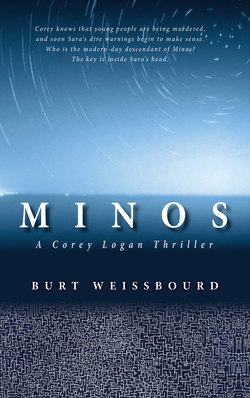Читать книгу Minos - Burt Weissbourd - Страница 7
На сайте Литреса книга снята с продажи.
ОглавлениеPROLOGUE
Minos admired his work. The scar was still there, if you looked closely, and yes, a thin line ran up from his partially closed eye, across his forehead. But now, there was the birthmark, a scarlet bloom, covering part of his left cheek. The way he did it, the birthmark was darkest in the center where it covered his scar. That way, the scar tissue was not so noticeable under the deep-purple inkblot, staining his cheek from lip to brow. He studied the bottles on the long table, dabbing his swabs in one, then another. Like a painter, Minos made adjustments on his palette before extending the birthmark downward.
He applied the eyeliner, then the shadow. These he used because it pleased the Master. Minos thought he looked fancy, even gaudy, but that was fine if it made the Master happy. The Master found beauty in unlikely things.
He looked again in the mirror and adjusted the overhead Halogens so that his face was fully lit. He liked how his curly black hair, a handsomely crafted wig, rested naturally on his head. Satisfied, he raised his long fingers and framed his face. Minos stood and waited, poised. When he felt steady and easy, even silky on the inside, he began his slow, silent dance. Minos’ fingers curled into fists, finding their marks in the air, uncurling again. His fingers moved deftly, making shapes in the air, until the extended forefinger of each hand settled just above his temples, curling forward. Then he swayed his body, graceful and deliberate.
He was back in ancient Crete, where every year there was a sacrifice of a boy, a surrogate for Minos, the Bull King. The boy reigned for a day then danced through the five seasons—lion, goat, horse, serpent and bull calf—as Zagreus, Zeus’s son by Persephone, had done when fleeing from the Titans.
Zeus had intended Zagreus to be his heir, and he entrusted him, like the infant Zeus in Cretan myth, to the care of the Titans. Hera, Zeus’s jealous wife, convinced the Titans to kill the child. When they tried to seize him, the divine infant showed great courage, transforming alternatively into a lion, a horse, a goat, a serpent, even a bull, as he fled in an attempt to escape. But the Titans grabbed his horns and feet and tore him apart, devouring him. Upon discovering their crime, Zeus struck the Titans dead with thunderbolts, turning them to ash. It is said that from the ashes of the Titans, containing the divine flesh they had just eaten, rose mortals, who were partly evil and partly divine.
Minos smiled into the mirror. Remembering this poignant story of how Zeus, Minos the Bull King’s father, had created humankind gave him new energy and increased the intensity of his dancing. Minos liked his dance, it reminded him of who he was and what he was capable of.
As he danced, his body changed. The heaviness and the worries lifted. Then, he was loose. Out from under. Riding the wave. He danced his silent dance, watching in the mirror, until the change was complete. When he was satisfied, Minos framed his face with his forefingers again. He bowed slightly, then adjusted his posture, stooping, just a little, so his shoulders disappeared. Minos affected a slowness, a tentativeness to his movements. He tilted his head down, just barely, so he wouldn’t make eye contact. He practiced his walk, bowing after, like a street performer, then put on his long, black leather greatcoat over black pants, a black turtleneck and his favorite black suspenders. It was almost time, he knew, but Minos checked his pocket watch anyway. He liked the feel of it in his palm. His father had carried this same silver watch on its tarnished silver chain. Yes, it was time to leave.
He stood in front of the mirror, still. When he was ready—when he felt just so—Minos turned off his Skytron Halogens, his Remcraft Baci mirror, and shuffled out into the world.
